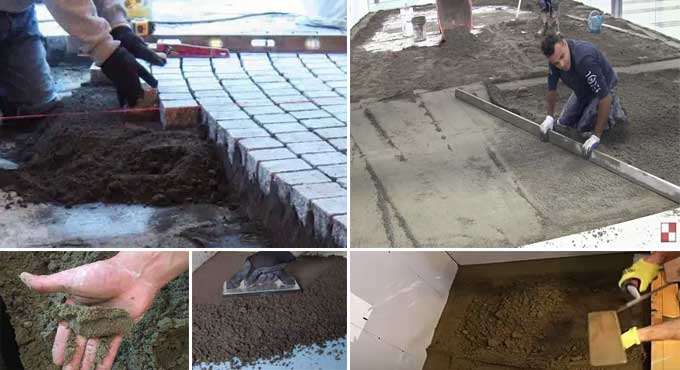
Dry Pack Mortar: Uses in Construction and its Advantages and Disadvantages
Cement, sand, and water are mixed in the appropriate proportion to produce dry pack mortar. Deck mud or floor mud is also known as dry pack mortar. In order to repair cracks in concrete and fill deep holes in concrete, dry pack mortar is used.
What do you mean by Dry Pack Mortar?
Dry pack mortar is a type of mortar that is mixed with a low amount of water to create a thick mixture that is commonly used in the construction industry. It is made up of a mixture of Portland cement, sand, and water, with the water content being kept to a minimum to ensure a dense and strong final product.
The mixture is then placed in a container, such as a wheelbarrow, and mixed until it has a consistency similar to damp sand. This mixture is then poured into the desired location and compacted with a trowel or other tool until it is tightly packed and level.
Dry pack mortar is often used as a base for shower pans, where it is used to slope the floor toward the drain. It can also be used to level floors, create a base for tile or stone installation, and for filling large voids or cavities. The use of dry pack mortar can help prevent cracking and ensure a strong and stable base for construction projects.
What are the steps for Dry pack mortar preparation?
The Steps someone needs to follow in order to make and prepare dry pack mortar are as follows:
- Start by wearing protective gear, including gloves, safety glasses, and a dust mask.
- Measure out the sand and cement in a ratio of 4:1, which means four parts sand to one part cement.
- Mix the sand and cement together thoroughly in a large bucket or wheelbarrow.
- Gradually add water to the mixture while stirring continuously until the mixture becomes thick and cohesive.
- Once the dry pack mortar has reached the right consistency, it's ready to use. Scoop up the mortar with a trowel and apply it to the concrete surface that needs to be repaired.
- Pack the mortar tightly into the area to be repaired, making sure to press it firmly into all the cracks and crevices.
- Smooth the surface of the mortar with a trowel or float, and then let it cure for at least 24 hours before exposing it to any stress.
- After the dry pack mortar has cured, you can paint or seal the surface as desired.
What are the merits of using Dry Pack Mortar?
The merits of using Dry Pack Mortar are listed as follows;
- Durability: Dry pack mortar is a strong and durable material that can withstand heavy use and extreme weather conditions.
- Water resistance: The mixture is designed to provide a water-resistant surface, making it ideal for shower floors, patios, and other areas that will be exposed to water.
- Cost-effective: Dry pack mortar is a relatively inexpensive material that can be easily mixed and applied, making it a cost-effective choice for many applications.
- Easy to work with: Unlike other types of mortar, dry pack mortar is easy to work with and can be moulded to fit any shape or contour.
- Customizable: Dry pack mortar can be customized to meet specific project requirements by adding different additives or adjusting the mixture to achieve the desired consistency.
- Bonding strength: When properly mixed and applied, dry pack mortar can create a strong bond between the surface it is applied to and any tiles or other materials that are installed on top of it.
- Low shrinkage: Dry pack mortar has low shrinkage properties, which means that it would not crack or shrink as it dries, leading to a more stable and long-lasting surface.
- Customizable colour: Dry pack mortar can be mixed with pigments or stains to create a custom colour that matches the surrounding environment or complements the design of the space.
- Can be used in various applications: Dry pack mortar can be used for a variety of applications, including creating shower pans, installing floor tiles, and creating exterior slopes and gradients.
- Time-saving: Dry pack mortar can be mixed and applied quickly, making it a time-saving solution for projects that require a fast turnaround time.
What are the demerits of using Dry Pack Mortar?
While dry pack mortar has its benefits, there are also some demerits to consider:
- Difficult to work with: Dry pack mortar is more difficult to work with than other types of mortar. It requires more effort to mix and place, and it can be challenging to achieve a smooth surface.
- Limited application: Dry pack mortar is not suitable for all applications. It is mainly used for levelling floors or shower bases and cannot be used for other types of masonry work.
- Longer curing time: Dry pack mortar has a longer curing time than other types of mortar, which can slow down the overall construction process.
To get more details, watch the following video tutorial.
Video Source: Schluter-Systems North America / Am?rique du Nord
- Prone to cracking: Dry pack mortar is more prone to cracking than other types of mortar, especially if it is not mixed properly or if it is applied too thinly.
- Requires skill: Properly mixing and applying dry pack mortar requires skill and experience, and it is not recommended for DIY projects unless the person has experience in using this material.
- Not waterproof: Dry pack mortar is not waterproof, and it can absorb moisture over time, which can cause damage to the underlying structure.


